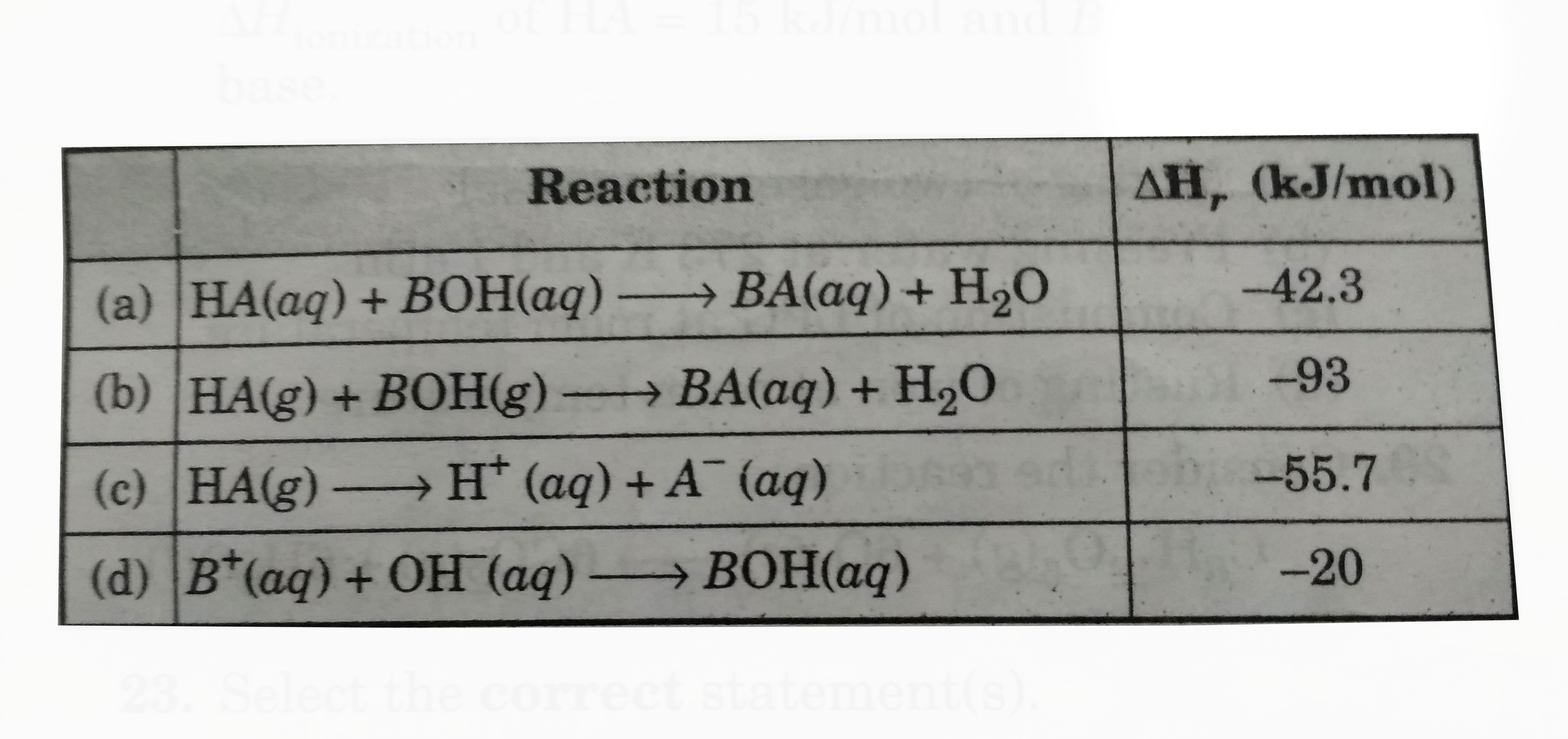From the following data, mark the option(s) where ΔH is correctly written for the given reaction.
Given : H+(aq)+OH−(aq)→H2O(l),ΔH=−57.3 kJ
ΔHsolution of HA(g)=−70.7 kJ/mol
ΔHsolution of BOH(g)=20 kJ/mol
ΔHionization of HA = 15 kJ/mol and BOH is a strong base.
ReactionΔHr(kJ/mol)(A)HA(aq)+BOH(aq)→BA(aq)+H2O−42.3
ReactionΔHr(kJ/mol)(B)HA(g)+BOH(g)→BA(aq)+H2O−93
ReactionΔHr(kJ/mol)(C)HA(g)→H+(aq)+A−(aq)−55.7
ReactionΔHr(kJ/mol)(D)B+(aq)+OH−(aq)−20
The correct Answer is:ABC
(D)BOH(g)+aqueous →B+(aq)+OH−(aq) ΔH=−20 kJ/mole
Topper's Solved these Questions
Similar Questions
From the following date , mark the opation(s) where ΔH is correctly written for the given reaction .
Given: H+(aq)+OH−(aq)→H2O(l),
ΔH=−57.3kJ
ΔHsolutionHA(g)=−70.7kJmole
ΔHsolutionBOH(g)=−20kJmole
ΔHionzatoin of HA=15kJ/mole and BOH is a strong base.

View SolutionWhat is the enthalpy of neutralization of HF against a strong base?
Given : H+(aq)+OH−(aq)→H2O(l),ΔrH∘=−56kJ/mol
ΔsH∘(HF,aq)=−329kJ/mol,ΔsH∘(H2O,l)=−285kJ/mol
ΔsH∘(F−,aq)=−320 kJ/mol
View SolutionH2O(g)→H2O(l),ΔH=−40.7kJ
ΔH is the heat of……………….of water.
View SolutionH2O(s)→H2O(l),ΔH=6.01kJ
ΔH is the heat of …………………of ice.
View SolutionState whether each of the following processes is exothermic or endothermic : HCl(aq)+NaOH(aq)→NaCl(aq)+H2O(l),ΔH=−57.1kJ
View SolutionIn the reaction,
CO2(g)+H2(g)→CO(g)+H2O(g), ΔH=2.8kJ
ΔH represents :
View SolutionH2O(l)→H2O(s),ΔH=−6.01kJ
ΔH is the heat of ……………….of water.
View SolutionConsider the following reaction between zinc and oxygen and choose the correct options out of the options given below
2Zn(s)+O2(g)→2ZnOs:ΔH=−693.8kJmol−1
View SolutionThe reaction given below
BaCl2(s)+2H2O(l)→BaCl2.2H2O,ΔHΘ=−xkJ The value of ΔHΘ represents
View SolutionDetermine the enthalpy of formation of B2H6(g) in kJ/mol of the following reaction :
B2H6(g)+3O2(g)→B2O3(s)+3H2O(g),
Given : ΔrH∘=−1941 kJ/mol, ΔH∘f(B2O3,s)=−1273 kJ/mol,
ΔH∘f(H2O,g)=−241.8 kJ/mol
View Solution
